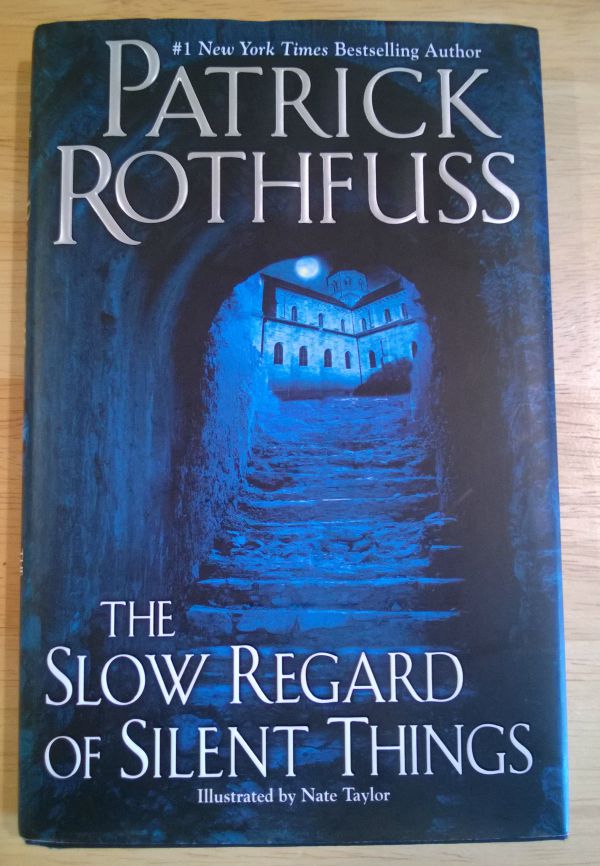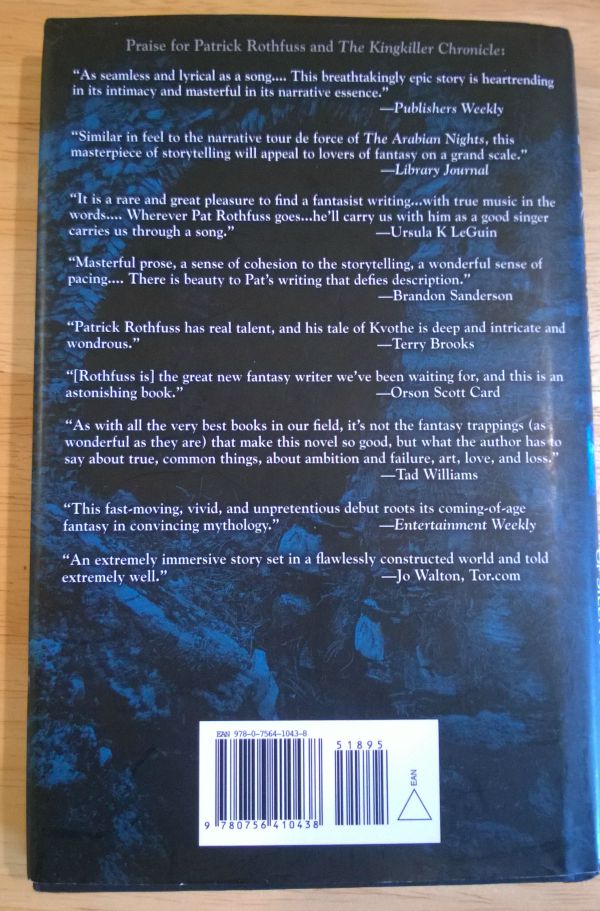Book Review: The Slow Regard of Silent Things
The Slow Regard of Silent Things, written by Patrick Rothfuss (of Kingkiller Chronicles fame), illustrated by Nate Taylor, and published by DAW Books in 2014, is a book very unlike either The Name of the Wind or The Wise Man’s Fear. Kvothe is never mentioned by name, only by reference and presence. Instead, this is the story of Auri, who lives in the Underthing, the massively sprawling complex of sewer tunnels that spans below the University where Kvothe learned sympathetic magic. The Slow Regard of Silent Things is the story of seven days in the Underthing with Auri, as she searches for the perfect gift (presumably for Kvothe), and it is a fascinating look into the mind of a woman who is beautiful, unique, and a little obsessive-compulsive.
Expanding on an earlier point, Auri’s story is so unlike the tale of Kvothe Kingkiller that Pat specifically calls it out in the foreword. Specifically, he says:
You might not want to buy this book.
I know that’s not the sort of thing an author is supposed to say. The marketing people aren’t going to like this. My editor is going to have a fit. But I’d rather be honest with you right out of the gate.
First, if you haven’t read my other books, you don’t want to start here.
My first two books are The Name of the Wind and The Wise Man’s Fear. If you’re curious to try my writing, start there. They’re the best introduction to my world. This book deals with Auri, one of the characters from that series. Without the context of those books, you’re probably going to feel pretty lost.
Just to be clear, I am familiar with both of Pat’s books, and I still felt pretty lost. But once I quit trying to force myself into Auri’s head and just experienced the world through her eyes, I found myself enjoying her tale immensely. Auri sees the world through a very unique viewpoint. To her, each physical item, whether it be a ball of yarn, a comb of honey, or a brass gear, has a personality, wishes, dreams. She does not presume to “force” her will upon the world. Instead, she patiently listens to each material and puts them in their place so they are content.
I found this entire premise to be fascinating. Think about it: I was trying to force myself into the story, to read it like Kvothe’s tale, and yet, I was profoundly unhappy. But then, when I chose to experience it for what it was, peace returned, not unlike Auri’s own existence. Whether this was Pat’s intention, I can’t help but feel amazed at the physical and emotional reaction I had while reading this. I rarely have such a strong emotional tie with another author’s work.

An example of Nate Taylor’s illustrations that can be found throughout The Slow Regard of Silent Things
As for the plot of the book itself? Well, that was lacking. Not that there wasn’t one, it’s just that…well…it was hard to find. I was almost halfway through The Slow Regard of Silent Things before I realized that Auri was looking for a gift for someone. I am pretty sure this is exactly what Pat was referring to in his foreword. Unlike Kvothe’s tale, Auri’s is more rambling and experiential. I can’t say that I enjoyed the plot, but I certainly enjoyed Pat’s writing.
So let’s talk about Pat’s writing. If you’re familiar with his work, even though The Slow Regard of Silent Things isn’t a Kvothe tale, Pat’s famously poetic prose is present in spades. If you’re not familiar with any of Pat’s work, then know that each word carries incredible weight, as though you can feel the hours of blood, sweat, and tears that the author has poured into his work. Each line has purpose. Each paragraph has strength. Most times I read for the story and don’t feel bad about skipping a bit ahead or through boring parts that don’t feel important. You can’t do that with Pat’s writing, and you don’t want to. Because each sentence feels important, and is interesting in its structure and word choice, I never wanted to skip ahead.
In conclusion, The Slow Regard of Silent Things is a fantastically written book that really has no business being consumed by anyone who doesn’t fall into the group of people that love Pat’s previous work and are looking for more of his poetic writing, or from people that enjoy experiential stories that deal with the mundane issues of life. While I enjoyed the writing, I admit that I like Kvothe’s character much more than Auri’s. I think that’s because Kvothe is motivated and proactive, where Auri is passive and goes with the flow. By her very nature, she doesn’t upset the balance of the world and often chastises herself as selfish for wanting things for herself.


